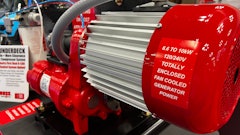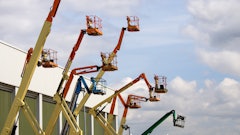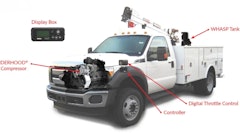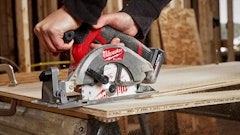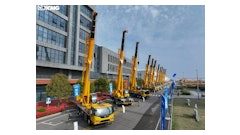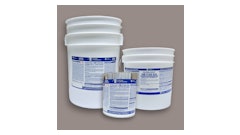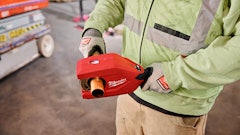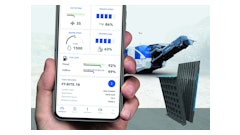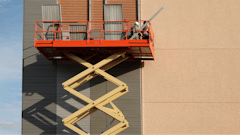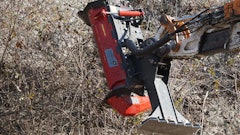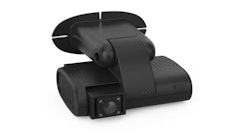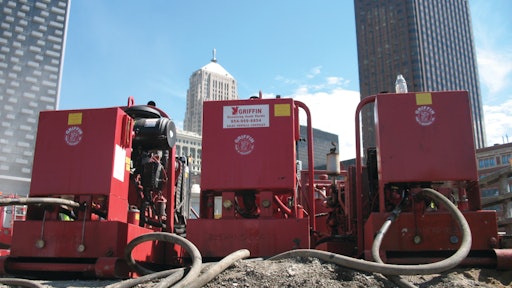
The equipment rental industry is becoming increasingly specialized, with national chains devoting entire divisions to things like power generation, safety and now pumps. Often an afterthought on the jobsite, pumps play a vital role in the safety and productivity of a project, so it's no surprise rental companies want to tap into this market. What's more is pumps have attractive margins and are in growing demand due to emerging markets such as oil and gas. So how can your business maximize this market's potential?
Besides their profitability, putting an extra focus on pump rentals makes sense for other reasons as well. For starters, your customers need your help. Dewatering solutions are rarely simple and often require deeper knowledge and expertise than some other types of equipment.
Joe Wagner, pump and shoring specialist with Ohio Cat, manages equipment and sales, as well as the application of equipment for his region. "We rent the whole package," he says, including his expertise. "The majority of my experience is with pump applications and proper sizing."
Wagner contends that to effectively serve professional customers with complicated dewatering needs, rental companies need to have someone on staff who focuses on pumps. "You need a person or group of people that understands the applications and sizing," he says. "There's no need for an engineering degree, but there is some calculating involved and you have to have some knowledge of the principals of hydraulics."
Jeff Wright, rental and bypass pumping specialist with Griffin Pumps says pump rentals themselves aren't getting more sophisticated, but succeeding at serving the market needs is. "Inexperienced people will simply ask their customers, 'when and where do you need the pump?' Sophisticated professionals, on the other hand, want to know what the application is and what's being done. We need to know what the customer is doing."
Do you need a specialist?
Wagner says there are two ways to approach pump rentals. One is to simply offer a small range of pumps for general applications. "This doesn't take too much technical background, and will account for just a small amount of rental revenue," he says."You don't need a pump specialist for that."
He continues, "When it becomes different is when you have an entire pump line with a lot of different sizes. Your core will be the 4- to 12-inch pumps. Each produces a different flow and pressure and you need to go through the hydraulic calculations when renting. At a certain point, you'll need to offer the pipe and fittings to supply the whole solution."
While it might seem simple, pumping water can be a dangerous situation if a system is set up incorrectly or if the customer doesn't understand the basics. For this reason, it's important to know your customers. "You build a relationship and go from there," Wright says. "The more you can prove to your customer that you know what you're talking about, the better it is. If you take care of the customer with the right solution, the revenue will take care of itself."
There are a lot of companies in the pump rental business, and that's nothing new. "What's changing is that more rental companies are realizing the revenue potential of pump rentals, but they're also realizing that if they already carry large equipment and don't offer pumping solutions, then their customer will need to go elsewhere," Wagner says. "Customers just want to make one call and get everything they need."
He continues, "A lot of companies want to offer whole pumping solutions, but it does take a significant investment. You have to build a large inventory. If you want to make that step from dabbling in pump rentals to offering entire systems, you need a person with the expertise to manage it."
It begins with a conversation
The start to any successful pump rental begins with asking your customer what they are trying to do. This will help determine the follow-up questions and, ultimately, the design of the pumping system.
Some questions a rental employee should ask initially include:
- Where is the application/pumping taking place?
- What are you pumping?
- How much needs to be pumped?
- How high does the liquid need to be pumped up/how much does the liquid need to be lifted/is the liquid in a large ditch (in other words, what is the lift and pressure)?
- How long will you be pumping?
Small dewatering jobs can be handled by gasoline-powered wet-priming pumps with suction and discharge sizes of 2 to 3 inches in diameter. These pumps can run for several hours on a tank of gas and will move up to 250 gallons per minute. On the other hand, large dewatering or sewer bypass jobs are far more complex and can involve 24-hour pumping operation and flows up to 4,000 gallons per minute and more.
Ask about the job
To best serve customers with large pumping projects, rental personnel need to understand that all jobs are different. They must have a working knowledge of pumps, the different types of pumps and which is best for certain applications. They also need to know about various accessories and how to properly set the pump up on the jobsite.
There might be contributing factors in the specific site that can lead to incorrect selections if not known. For example, a typical customer might ask for a diesel-driven pump capable of pumping 500 gpm. There are a multitude of pumps that will meet this requirement. If the customer is a little more specific and requests 500 gpm at 100' TDH, there is now enough information to size the pump, but there is still not nearly enough information to properly fit the application.
If a typical end-suction centrifugal pump is rented by a rental company and the application is a sewage bypass, you would have a sewage spill occur, as a typical end-suction centrifugal pump is not meant to pump sewage. The proper pump needed would be a diesel-driven trash pump. If the rental company did catch that the customer needed a trash pump but then did not pay attention to the solids handling capacity, which for most bypasses is 3 inches or larger, then a sewage spill is likely to occur as some pumps of this capacity have smaller solids handling capacities.
If all this information was gathered - 500 gpm at 100' TDH pumping sewage with 3-inch solids handling capability - but the suction lift was not given and it turned out to be 28 feet, there is a still a problem. Under this condition, unless the rental employee is very familiar with Net Positive Suction Head (NPSH) both AVAILABLE (NPSHa) and REQUIRED (NPSHr) by the pump, very likely the wrong pump would have been selected as the NPSHr of the pump and suction lift are big factors in proper pump selection. Should the suction lift be any more than 28 feet, then the rental employee needs to know NOT to rent a diesel-driven pump and suggest a submersible pump, as suction lifts of greater than approximately 28 feet need to be submersible and not above-ground pumps, regardless of whether there is any type of priming device on the pump.
Other items that must also be considered are the size of the suction and discharge lines, their pressure ratings, valves required and a host of other factors.
Bottom line
Highly critical projects are best tackled by specialty contractors who use all types of pumps in their everyday operations, but ultimately, your customer is responsible for the job he or she does. When a complex pump rental is clearly outside your realm of experience, it might be in your best interest to refer the job to a specialized pump rental company.
But in those cases where you have the equipment your customer needs and the situation is within the scope of your services, the best thing you can do to assist your customer is to know your stuff. Educating your staff on the science behind pump rentals will help them be the best solutions provider to your customers who need to move water.
For rental businesses, the process of renting pumps is more than just getting the customer out the door with products. Today's construction professionals want whole solutions and they want them in an efficient, cost-effective way. Now's the time to ask yourself if your business is equipped to take pump rentals to the next level with a wide range of equipment and a knowledgeable staff.






